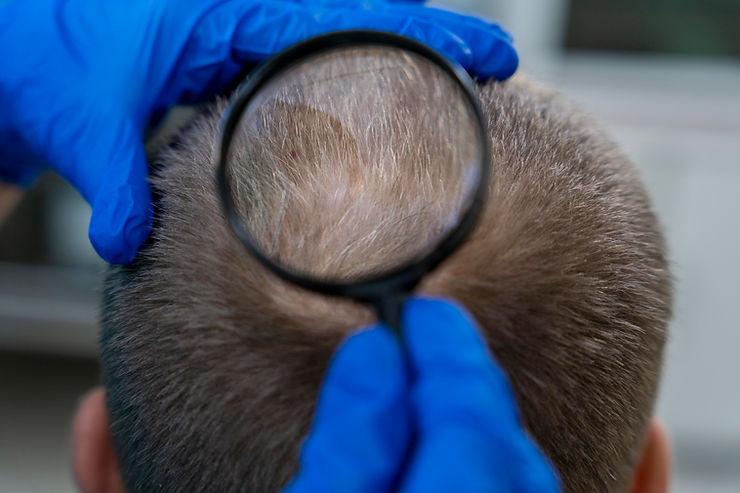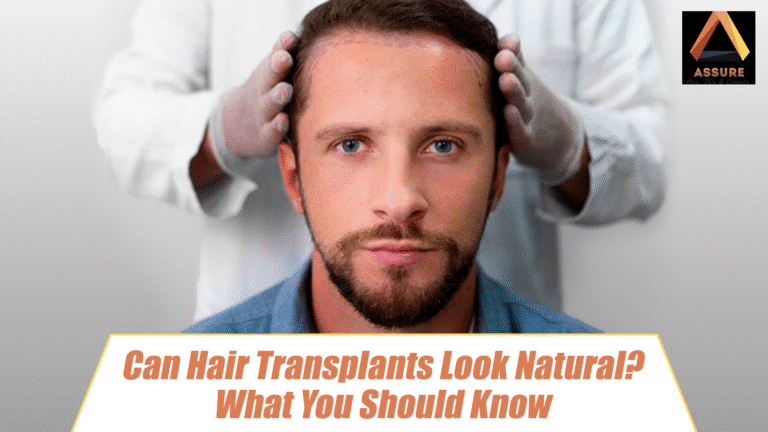Introduction: Alopecia, or hair loss, affects millions of people worldwide and can be a distressing experience for anyone. Understanding the various causes, symptoms, and types of alopecia is crucial in determining the best course of action to address hair loss. At Assure Clinic, our team of professionals can help you navigate the complexities of alopecia and provide tailored treatment options to restore your hair and confidence. In this comprehensive guide, we will discuss the different aspects of alopecia, helping you recognize early signs of hair loss and make informed decisions about your hair restoration journey.
Causes of Alopecia
- Genetic Factors: Genetics play a significant role in hair loss, particularly in androgenetic alopecia, which is the most common form of hair loss in both men and women. A family history of hair loss can increase your risk of experiencing it yourself.
- Hormonal Imbalances: Hormones can significantly impact hair growth, and imbalances can lead to hair loss. Conditions such as polycystic ovary syndrome (PCOS), thyroid disorders, and menopause can cause hormonal fluctuations that result in hair loss.
- Autoimmune Disorders: Alopecia areata, an autoimmune disorder, occurs when the body’s immune system mistakenly attacks hair follicles, leading to hair loss. Other autoimmune conditions, such as lupus and rheumatoid arthritis, can also cause hair loss as a side effect.
- Nutritional Deficiencies: A lack of essential nutrients, such as iron, zinc, biotin, and protein, can lead to hair loss. Maintaining a balanced diet and addressing nutritional deficiencies can help support healthy hair growth.
- Physical and Emotional Stress: High levels of stress can disrupt the hair growth cycle, leading to hair shedding. Managing stress and seeking help for mental health issues can help prevent stress-induced hair loss.
- Medical Treatments and Medications: Certain medications, such as blood pressure medications, antidepressants, and chemotherapy, can cause hair loss as a side effect. It’s crucial to discuss potential side effects with your healthcare provider before starting new medications.
Symptoms of Alopecia
- Gradual Thinning: One of the most common signs of hair loss is a gradual thinning of the hair, which can be more noticeable in certain areas of the scalp, such as the crown or hairline.
- Patchy Hair Loss: Some types of alopecia, such as alopecia areata, cause patchy hair loss, which appears as small, round, and smooth bald spots on the scalp.
- Sudden Hair Shedding: Hair shedding can occur suddenly due to stress or other factors, leading to an overall thinning of the hair.
Full-Body Hair Loss: In rare cases, some individuals may experience hair loss not only on their scalp but also throughout their entire body.!
Types of Alopecia
- Androgenetic Alopecia: This type of hair loss, also known as male-pattern or female-pattern baldness, is the most common form of alopecia and is primarily influenced by genetic factors and hormonal imbalances.
- Alopecia Areata: An autoimmune disorder that results in patchy hair loss, which can progress to total hair loss on the scalp (alopecia totalis) or the entire body (alopecia universalis).
- Telogen Effluvium: A temporary form of hair loss triggered by stress, hormonal imbalances, or medications, characterized by excessive hair shedding.
- Traction Alopecia: This form of hair loss is caused by constant tension on the hair, such as tight hairstyles, braids, or hair extensions. Over time, the pulling can damage hair follicles and lead to hair loss.
- Cicatricial (Scarring) Alopecia: A rare form of hair loss caused by inflammation and scarring of the hair follicles, which permanently destroys them and prevents hair regrowth.
- Central Centrifugal Cicatricial Alopecia (CCCA): A form of scarring alopecia that primarily affects women of African descent, characterized by hair loss that starts at the crown of the head and gradually spreads outwards.
How Assure Clinic Can Help
At Assure Clinic, our team of experts is dedicated to helping you understand the complexities of alopecia and providing tailored treatment options to address your hair loss concerns. Our services include:
-
- Comprehensive Consultation: Our specialists will conduct a thorough assessment of your hair and scalp, taking into account your medical history, lifestyle factors, and family history of hair loss to determine the most suitable treatment options.
- Personalized Treatment Plans: Based on your individual needs, we will develop a personalized treatment plan that targets the underlying causes of your hair loss and promotes hair regrowth.
- Advanced Hair Restoration Techniques: Our clinic offers state-of-the-art hair restoration techniques, such as Follicular Unit Extraction (FUE), Advanced FUE, and DSHI implantation, to provide natural-looking, virtually undetectable results.
- Non-Surgical Treatment Options: In addition to hair transplant procedures, we also offer non-surgical hair loss treatments, such as PRP therapy, low-level laser therapy, and nutritional counseling, to support healthy hair growth.
- Ongoing Support and Guidance: Our commitment to your hair restoration journey goes beyond the initial treatment. We provide ongoing support and guidance to ensure you achieve and maintain optimal results.
Conclusion
Understanding alopecia is crucial in addressing hair loss and finding the most effective treatment options. At Assure Clinic, our team of experts is here to guide you through the complexities of alopecia and provide tailored solutions to help restore your hair and confidence. Contact us today to schedule a consultation and take the first step towards a healthier head of hair.





